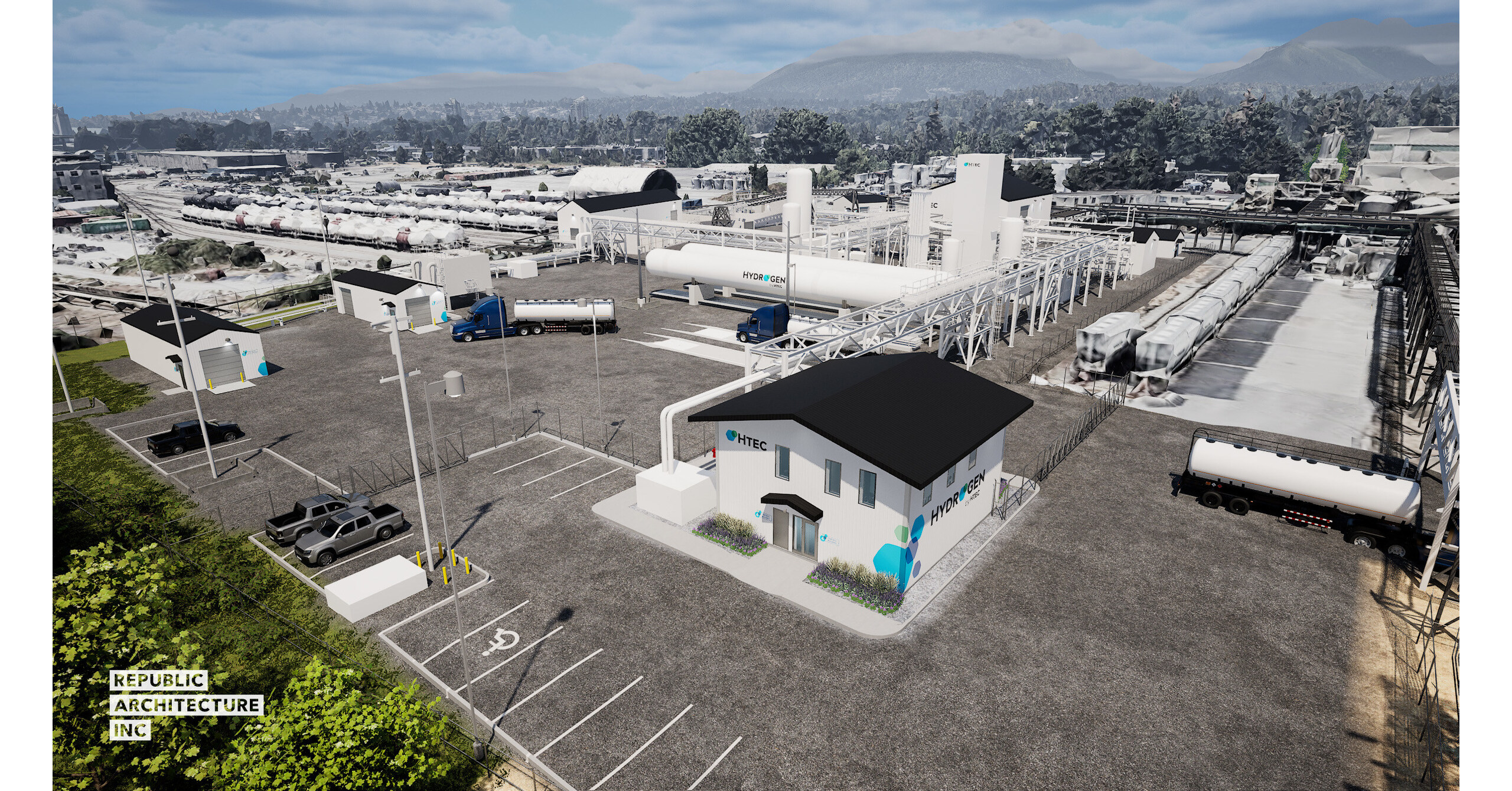Infra
CIB invests $337 million towards hydrogen production and refuelling network in Western Canada

Partnership enables HTEC’s H2 Gateway program, an emerging hydrogen infrastructure ecosystem
Disponible en français
- HTEC to build a by-product hydrogen liquefaction facility and three new hydrogen production facilities to expand Canada’s low carbon fuel supply capacity.
- Investment will bring up to 20 hydrogen refuelling stations online in British Columbia and Alberta, more than doubling the amount of refuelling stations in Canada.
- Supports the heavy-duty transportation sector in adopting hydrogen-fuelled vehicles.
- Estimated to generate more than 280 full-time jobs over the construction and operations phases.
VANCOUVER, BC, May 24, 2024 /CNW/ – The Canada Infrastructure Bank (CIB) and HTEC, a Vancouver-based designer, builder, owner and operator of hydrogen supply solutions, are partnering to accelerate the deployment of hydrogen production and refuelling infrastructure. Joining the CIB and HTEC today at the announcement were representatives from the Government of British Columbia and Government of Canada.
The CIB’s $337 million loan will expedite and expand HTEC’s operations in British Columbia and Alberta. The investment will contribute to the implementation of HTEC’s full-service, sustainable fuel supply chain focused on reducing emissions in the transportation sector, called H2 Gateway.
HTEC plans to build and operate an interprovincial network of up to 20 hydrogen refuelling stations to support the deployment of fuel cell vehicles and advance greener transportation solutions. The refuelling stations will be supported by three new hydrogen production facilities located in Burnaby, Nanaimo and Prince George, and a facility that liquefies 15 tonnes per day of vented by-product hydrogen in North Vancouver. It is estimated that more than 280 full-time jobs will be created to build, operate and support the hydrogen infrastructure.
Hydrogen fuel cell vehicles can travel long distances and have relatively short refuelling times, presenting a unique opportunity to decarbonize the commercial trucking sector. As part of this investment, 14 of the 20 new stations will enable the refuelling of up to 300 heavy duty vehicles per day.
Once fully operational, it is forecasted transportation sector greenhouse gas emissions will be reduced by approximately 133,000 tonnes annually.
H2 Gateway, an estimated $900 million program is focused on building hydrogen transportation ecosystems, driving which drives adoption of hydrogen as a transportation fuel in targeted regional hubs.
The CIB’s financing will help accelerate the implementation of hydrogen technology and help mitigate uncertainty in the rate and pace of hydrogen adoption, which have historically been barriers to private investment in sustainable fuel production and infrastructure.
The partnership represents the third investment through the CIB’s Charging and Hydrogen Refuelling Infrastructure (CHRI) initiative, which is focused on expanding the private sector’s rollout of large-scale charging and hydrogen refuelling infrastructure.
The CIB’s investment builds on previous support HTEC has received from Canada to advance clean transportation, including $5 million from PacifiCan’s Business Scale-up and Productivity funding and $3 million from Natural Resources Canada’s Zero Emissions Vehicle Infrastructure Program for its 2-tonne-per-day low-carbon hydrogen production and liquid transfer facility in Burnaby, BC.
Endorsements
Our partnership creates the right conditions for HTEC to expand its operations aimed at reducing greenhouse gas emissions in the transportation sector. By investing in hydrogen production, distribution, and refuelling infrastructure, we are accelerating the deployment of this sustainable fuel solution. New partnerships in this emerging sector will help increase domestic hydrogen production and ensure Canada is economically competitive in a decarbonizing world.
Ehren Cory, CEO, Canada Infrastructure Bank
Unlocking the potential of clean hydrogen is an essential step in decarbonizing and growing a prosperous, clean economy in Canada. It is also essential for Canada, as a country with over 100 years of experience in hydrogen innovation and proven global leadership in the energy space, to assist our democratic allies as they decarbonize and enhance their energy security. As outlined in our Hydrogen Progress Update, remarkable advancements have been made to the hydrogen landscape in Canada since the release of our Hydrogen Strategy in 2020. Today’s CIB announcement is a further testament to this federal government’s support for sustainable energy innovation in the race to net zero.
The Honourable Jonathan Wilkinson, Minister of Energy and Natural Resources
The CIB’s Charging and Hydrogen Refuelling Infrastructure initiative focuses on transitioning Canada towards a sustainable fuel infrastructure ecosystem. HTEC, based right here in British Columbia, is developing innovative methods to reduce greenhouse gas emissions in the heavy-duty transportation sector. This investment will support Canada in reaching its net-zero emissions target by 2050, generate jobs in Burnaby and across western Canada, and enhance how Canadians travel.
The Honourable Terry Beech, Minister of Citizens’ Services and Member of Parliament for Burnaby North-Seymour.
Producing clean fuels like hydrogen right here in B.C. to replace diesel use for transportation helps to reduce harmful pollution, while creating new jobs and opportunities in the clean economy. By supporting innovative projects like H2 Gateway, we can ensure that BC remains a world-leader and attracts new investment in the growing clean economy.
Josie Osborne, Minister of Energy, Mines and Low Carbon Innovation for British Columbia
The H2 Gateway vision for HTEC is now being realized. With the CIB’s strategic investment, we are poised to establish highly sustainable hydrogen ecosystems that will drive the adoption of zero-emission transportation and support larger regional hydrogen hubs. An investment of this magnitude signals confidence in HTEC and the network of dedicated partners delivering safe, low-carbon energy solutions, putting Canada on the map.
Colin Armstrong, President and CEO, HTEC
HTEC
HTEC works across the clean hydrogen value chain, developing, integrating and operating clean hydrogen energy solutions in strategic North American markets to enable the transportation sector’s transition to a low-carbon future. The company designs, builds, owns and operates hydrogen fuel production, infrastructure and supply solutions to support the deployment of hydrogen electric light-medium- and heavy-duty transportation. For more information, visit htec.ca.
SOURCE Canada Infrastructure Bank
Media contacts: Canada Infrastructure Bank, [email protected], 416-347-3358; HTEC, [email protected], 604-904-0412










